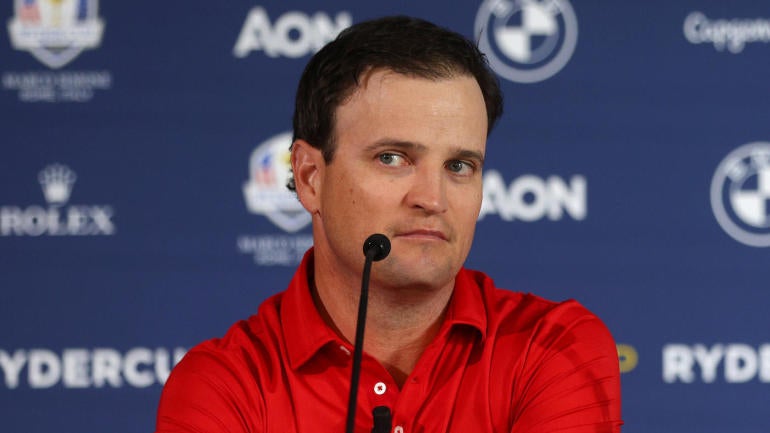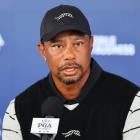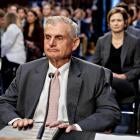
As the 2023 Ryder Cup draws closer, the United States team picture has somehow become more confusing. Luckily for captain Zach Johnson, this week at the BMW Championship represents the end of automatic qualifying with options narrowing from there.
The top six in the Ryder Cup standings after this week will represent the Americans in Rome next month, but the final six captain's picks will not be made by Johnson until after the Tour Championship the following week.
There was some movement in the top 12 after the FedEx St. Jude Championship -- just not a significant amount. The greater tumult resided outside the top 12 where Lucas Glover's extraordinary leap from outside the top 50 two weeks ago to 16th has muddied the water when it comes to what this team is officially going to look like.
U.S. Ryder Cup team rankings
| Rank | Name | Points |
|---|---|---|
| 1 | Scottie Scheffler | 25,857.74 |
| 2 | Wyndham Clark | 13,406.92 |
| 3 | Patrick Cantlay | 10,614.75 |
| 4 | Brian Harman | 10,310.54 |
| 5 | Brooks Koepka | 9,421.15 |
| 6 | Max Homa | 8,848.76 |
| 7 | Xander Schauffele | 8,830.27 |
| 8 | Jordan Spieth | 8,066.33 |
| 9 | Cameron Young | 7,795.31 |
| 10 | Collin Morikawa | 7,503.48 |
| 11 | Keegan Bradley | 7,486.47 |
| 12 | Sam Burns | 7,002.70 |
| 13 | Rickie Fowler | 6,936.49 |
| 14 | Justin Thomas | 6,539.20 |
| 15 | Denny McCarthy | 6,280.67 |
| 16 | Lucas Glover | 6,112.61 |
| 17 | Kurt Kitayama | 5,824.27 |
| 18 | Will Zalatoris | 5,529.13 |
| 19 | Harris English | 4,976.09 |
| 20 | Russell Henley | 4,931.88 |
| 21 | Tony Finau | 4,667.75 |
| 22 | Taylor Moore | 4,576.99 |
| 23 | Adam Schenk | 4,553.09 |
| 24 | Chris Kirk | 4,550.27 |
| 25 | Sahith Theegala | 4,365.35 |
There are two aspects of this year's qualification that make it more complex than recent Ryder Cups. The first is that 2023 has seen two "outlier" major champions. One expects Brooks Koepka or Collin Morikawa or Scottie Scheffler to win majors and play his way onto the team. Those players winning big-time events is built into the rankings model.
Wyndham Clark and Brian Harman winning those majors? Not so much. And while those two will have earned their way onto the team thanks to their play at this summer's majors, their presence complicates the calculus for the rest of the team.
It makes the bottom half -- where players who were presumed to be on the team as recently as six months ago litter the landscape -- that much more difficult to sort out.
The accumulation of points has also changed. In 2023, players get one point for every $1,000 earned at non-majors and 1.5 points for every $1,000 earned at majors (except for winners of those events, who receive 2 points for every $1,000 earned). The PGA Tour's monstrous purse sizes at elevated events this year have similarly changed the calculation.
Finishing second at, say, the RBC Heritage is worth nearly as many points (2,180) as finishing T2 at the Masters (2,376). This has thrown the Ryder Cup standings and Johnson's decision for a loop because, while playing well at the elevated events is impressive, it's not considered as much of a test as thriving in the heat of major championships.
And then there's LIV Golf where Bryson DeChambeau recently shot a 58 and has been playing terrific golf for several months now, even though he does not earn any points that qualify for him for this team based on his play in that league. He has been playing, at least statistically, even better than Glover and made the cut at three of the four majors this year (including a fourth-place finish at the PGA Championship).
Then there is the evergreen Justin Thomas question. J.T. missed the FedEx Cup Playoffs by one spot and has been statistically worse than Chad Ramey and Carson Young over the last three months. However, he has previously been the soul of this U.S. team, and it would have been unfathomable even three months ago to suggest that he might not be on the team.
So, who will ultimately represent the Americans when Johnson makes his selections two weeks from Monday?
Some of that depends on what happens at this week's BMW Championship. Glover could absolutely play his way onto the team with another great finish at Olympia Fields ... or somebody else like Denny McCarthy or Russell Henley could win and further complicate the proceedings.
For the sake of argument, though, let's say everything stays relatively calm and instead consider incentives. Captains are incentivized to stick close to the standings because, if they stray too far outside of them, criticism will be abundant should their respective teams ultimately lose.
Plus, most great players are conservative by nature, and great players go on to become Ryder Cup captains. Johnson is a conservative's conservative when it comes to decision making, so it's quite difficult to envision him going way off the board here.
Furthermore, as an underdog throughout his career, Johnson is a big "you have to earn it" guy. This means the top 12 in the standings will likely be close to the 12 he ultimately picks for Rome. I don't believe he will get caught up in taking a hot hand who has been objectively mediocre for longer timeframes than are being considered (say, six or nine months) if that hot hand is still decently outside of qualification.
So, who will he pick? If Johnson had to choose the team today, the U.S. side would likely consist of the top 11 with Rickie Fowler (13th) in for Sam Burns (12th). Not saying that's what it should be or even what it will be in two weeks, only what it likely would be right now.
This is a long way from over, though, and a lot can change in two weeks. Consider how much has changed in just the last two weeks. This time two weeks ago, Glover was 64th (!) in the standings and not even close to making the FedEx Cup Playoffs. Two weeks later, he has consecutive victories and is knocking on the door to get on this team.
The part that is striking and difficult to reconcile this time around is just how weird everything could get over the next two weeks. Nearly every Ryder Cup year, there seems to me more clarity about what the team should be as the FedEx Cup Playoffs unfold
This year -- with a scattered golf landscape replete with stars playing poorly and journeymen playing great -- there is almost no clarity at all, which means Johnson's decision is going to be more interesting (and thus more critiqued) than it normally would be.





















